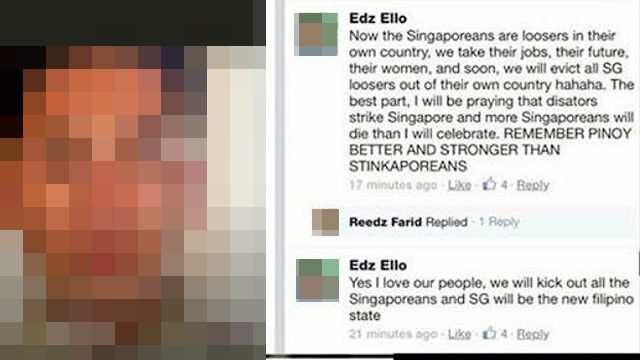SUMMARY
This is AI generated summarization, which may have errors. For context, always refer to the full article.
 Filipinos are no strangers to making the headlines in Singapore.
Filipinos are no strangers to making the headlines in Singapore.
Last June 2014 a Philippine Independence Day celebration in Singapore was the subject of xenophobic heckling and harassment online, causing the organizers to cancel the event. (READ: Pinoy group in Singapore drops Independence Day event plan)
A few days ago the couple behind The Real Singapore, a popular alternative news site, was charged with sedition. The cause? They allegedly claimed that a Filipino family caused an incident during Thaipusam, a Hindu festival celebrated by the Tamil community.
Online forums are regularly flooded with comments referring to Filipinos as “foreign trash” or “cockroaches,” making Overseas Filipino Workers (OFWs) feel angry, ashamed or even apathetic. These derogatory comments are nothing new. The question is whether OFWs should feel obligated to defend their kababayan tooth and nail in a nationalistic effort to change the narrative about Filipinos abroad.
But the controversy sparked by Edz Ello, a Filipino nurse working in a government hospital in Singapore recently charged with sedition and lying to the police for posting hateful comments about Singaporeans online, paints a different picture.
Instead of defending a fellow Filipino, the OFW community too condemned his actions, to the extent of saying that he deserved the strict consequences that followed.

The unspoken rule: don’t bite the hand that feeds
Most OFWs believe that it’s a privilege to be working overseas, especially in Singapore, where the earning capacity tends to be much higher than back in the Philippines.
Regardless of your nationality or income, the bottom line is that every expatriate and migrant worker is a guest in a foreign country. It’s an implicit agreement – that locals expect respect and sensitivity from those who would share their home.
In the case of Edz Ello, both Singaporean and Filipino netizens alike felt that the hateful comments he posted reflected the exact opposite. They said, “Don’t bite the hand that feeds,” an unspoken rule about not offending your benefactor that OFWs are all too familiar with.
Boundaries of free speech
While OFWs are used to a culture of freedom of speech back home, once we venture beyond our borders the boundaries become gray. Living abroad makes us more self-aware of our actions, especially online, not merely out of fear of being deported or arrested, but also out of respect to our host country.
Singapore, on the other hand, is known for its strict laws about voicing opinions publicly.
The priority of the government is to preserve harmony in a multicultural society, where race is a major social identifier for locals. As mentioned by Law and Foreign Affairs Minister K Shanmugam, “You have full freedom of speech [in Singapore] but it doesn’t extend to offending somebody else.”
So similar to how religion is a popular yet sensitive topic in the Philippines, such inflammatory comments along national and racial lines can elicit controversy in Singapore. This is increasingly relevant amidst growing concerns about the influx of foreigners in recent years, with an almost 40% foreign population.
Goodwill ambassadors
172,700 Filipinos work in Singapore, according to the latest publicly available Philippine government data. As part of the foreigner population in Singapore, the responsibility of OFWs is to become goodwill ambassadors for the Philippines.
We are guardians of the Filipino name for the world at large, whose only points of reference about the Philippines are sweeping generalizations and often negative stereotypes. That’s why the OFW community did not speak up on behalf of Edz Ello. They agree that his actions unfairly represented Filipinos. Even some locals echo the same sentiment – don’t let the actions of one Filipino paint the wrong picture of an entire race.
The Ello controversy reminds us that nationalism goes beyond our bloodline, heritage, language and the color of our skin. It’s about knowing that we can be better Filipinos, while holding our fellow kababayans accountable to that very standard.
As an OFW, that means doing our utmost best in protecting our name abroad. Then perhaps, we’ll be making headlines for all the right reasons. – Rappler.com
Rica is a ‘foreign filipina,’ born in Indonesia, raised in the Philippines and working in Singapore. She writes beyond the border, about experiencing the world with foreign eyes and with local heart. Follow her adventure on ForeignFilipina.com, Outandabroad.com as well as on Twitter and Instagram.
Add a comment
How does this make you feel?
There are no comments yet. Add your comment to start the conversation.